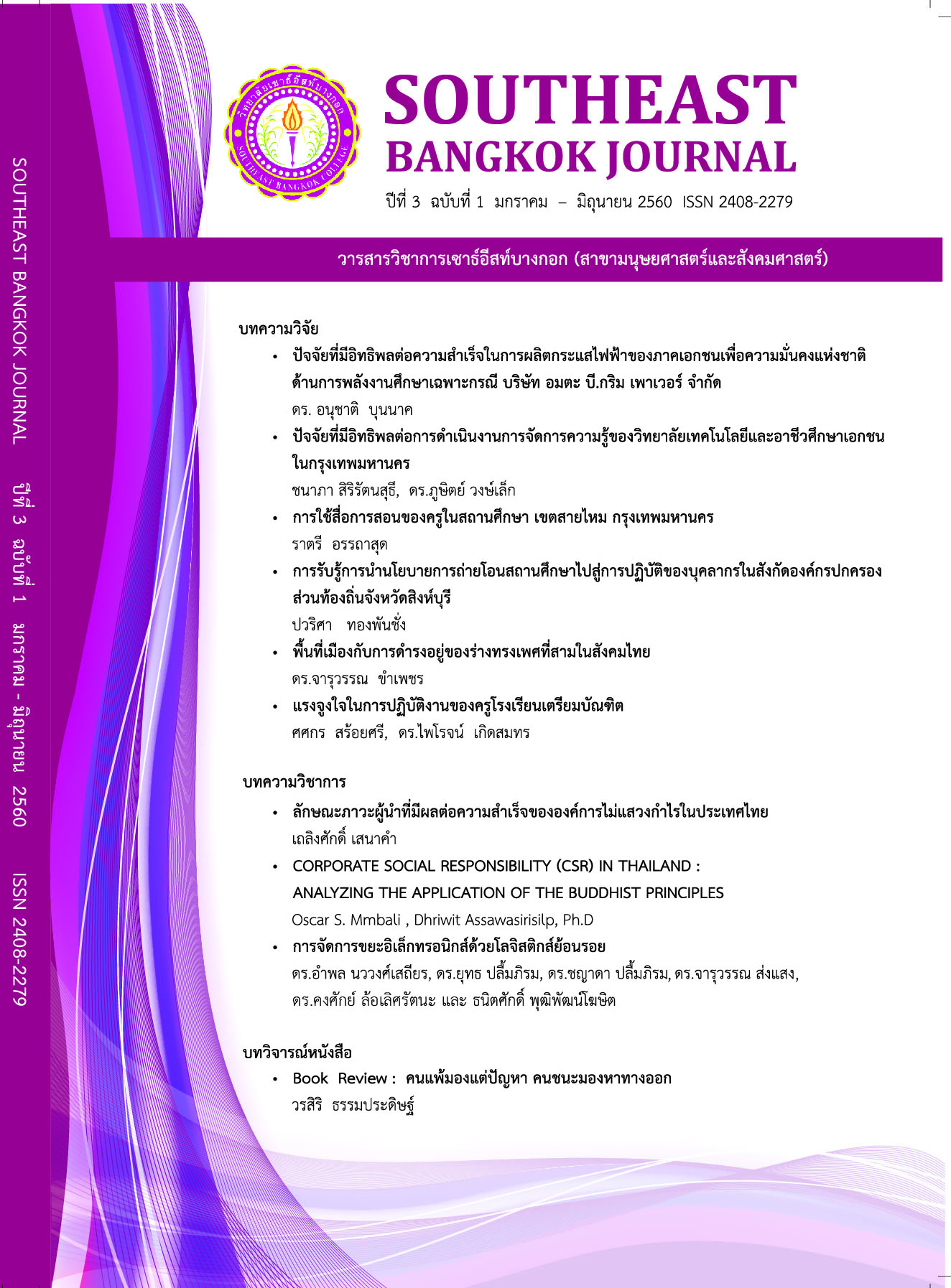ลักษณะภาวะผู้นําที่มีผลต่อความสําเร็จขององค์การไม่แสวงกําไร ในประเทศไทย
Main Article Content
บทคัดย่อ
บทความวิชาการนี้มีวัตถุประสงค์เพื่อให้ทราบถึงปัจจัยที่มีผลต่อความสําเร็จขององค์การ ไม่แสวงกําไรในประเทศไทย พบว่าความสําเร็จขององค์การขึ้นกับผู้นําเชิงบารมีเป็นสําคัญ
ที่มีอิทธิพล ทําให้ผู้ตามเกิดแรงจูงใจ ความเลื่อมใส ความเคารพ ทําให้นําไปสู่ การอุทิศตน การเอาผู้นําเป็น แบบอย่างในการทํางาน และการทําให้เกิดการยึดเกาะกันของคนในองค์การ ล้วนเป็นปัจจัยที่สําคัญ ที่สุดต่อความสําเร็จขององค์การไม่แสวงกําไรในประเทศไทย นอกจากนี้ยังพบว่าผู้นําในระดับ คณะกรรมการและประธานที่มีลักษณะภาวะผู้นําเชิงบารมีที่โดดเด่นด้านสถานะทางสังคมสูง มีชื่อเสียง มีเกียรติยศ การศึกษาสูง ทําให้องค์การได้รับความน่าเชื่อถือ (Creditability) และความ เคารพ (Respectability) จากผู้สนับสนุนหรือผู้บริจาค ลักษณะภาวะผู้นําเชิงบารมีดังกล่าวนี้มีผล ทําให้ผลการดําเนินงานขององค์การที่ดีขึ้น
Article Details
เอกสารอ้างอิง
Conger, J. A, & Kanungo, R (1999). Charismatic leadership in organizations. Thousand Oaks, CA SAGE
Conger, J. A, Kanungo, R, & Menon, S. T. (2000). Charismatic leadership and follower effects. Joumol of organizational Behavior, 20(7), 747-767.
Coombes, M. T. (2008). Boards of directors and nonprofit entrepreneurial orientation: catalyst, inhibitor, or in consequential? (Doctoral Dissertation, Syracuse University).
Dulewicz, V., & Higgs, M. (2005). A new instrument to assess leadership dimension and styles. Selection & Development Review, 2012), 7-12.
Hasan, S., & Onyx, J. (2008). Comparative third sector governance in Asia : structure, process, and political economy. New York Springer.
House, R. J. (1977). A 1976 theory of charismatic leadership. In Hunt, J. G., & Larson, L. (Eds.), leadership: the abutting edge. Carbondate: Southern Illinoise University Press.
Hudson, M. (1999). Managing without profit. London: Penguin Books
Jayakody, J. A S. K. (2008). Charisma as cognitive-affective phenomenon : a follower centric approach. Management
Decision, 46(6), 832-845.
Juree Vichit-Vadakan. (2002). The country report in investing in ourselves giving a fund raising in Thailand. Manila: Asia Development Bank
Khandwalla, P. N. (1977). Some top management style, their context and performance Organization and Administrative Science, 714), 21-51.
Knutsen, L. W. (2012). Value as a self-sustaining why some nonprofit organizations are different from and similar to private and Public Organizations. Nonprofit and Voluntary Sector Quarterly, 42 October), 1-21.
lecovich, E. (2004). Responsibilities and roles of boards in nonprofit organizations: the Israeli case. Nonprofit Management & Leadership, 25(1), 5-24. Mort, Gillian S, Weerawardena, Jay, & Camesie,
Kashonia. (2003) Social entrepreneurship towards conceptualization. International Journal of Nonprofit and Voluntary Sector Marketing, 9(1), 76-82.


